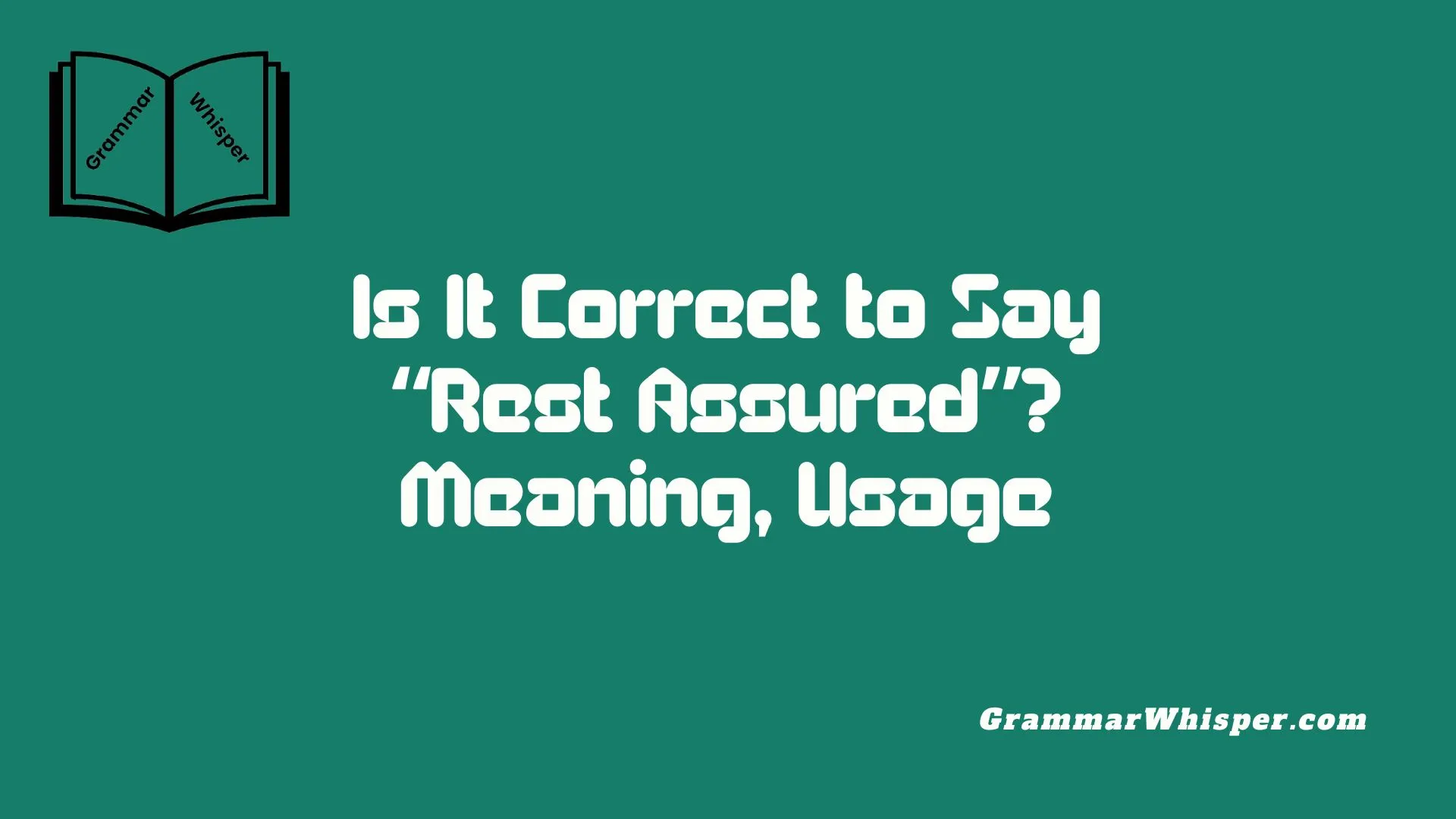The phrase “rest assured” remains one of the most timeless pieces of language, having quietly maintained its power for centuries. You’ll find it in an official statement, a business email, or a comforting message from a friend. Though its form has remained consistent, its relevance has only increased with modern usage. In real-world editorial and client communication, this expression injects tone, authority, and empathy – especially in uncertain situations. It’s not just a fancy way to say “don’t worry.” It’s a verbal handshake loaded with confidence and trust. And yes, it is grammatically correct.
What makes this phrase impactful is its ability to adapt to the context. Whether you’re writing to reassure a team during a corporate crisis, or replying to a worried customer, “rest assured” offers emotional clarity without coming off as overly dramatic. Its meaning is straightforward, but the history behind it is rich. The origins of this expression trace back to early English, where “rest” meant peace, and “assured” implied something certain or guaranteed. If the term sounds old-school, don’t stress – there are other alternatives, but few provide the same calm professionalism. This article explores its evolving grammar, compares alternatives, and teaches you how to use the term with precision.
Understanding “Rest Assured” – What It Really Means
At its core, the phrase “rest assured” is a way to reassure someone with confidence and certainty. It means:
“You can be certain or confident that something is true or will happen.”
Example: Rest assured, your package will be delivered by tomorrow.
It’s commonly used to calm concerns, provide a sense of security, or emphasize reliability.
Key Elements of the Phrase:
- Rest = to be at ease, not worry
- Assured = guaranteed, promised, certain
Together, it becomes an idiomatic way of saying “you don’t need to worry because this is taken care of.”
The Etymology of “Rest Assured” – Where Did It Come From?
To understand why “rest assured” is correct, we need to explore its historical roots.
Historical Development:
- “Rest” derives from Old English restan, meaning to be still or at peace.
- “Assured” stems from Old French asseurer and Latin securus, meaning to make safe or secure.
The phrase started appearing in 17th-century English correspondence and legal documents, usually to imply trust and certainty.
Used in Classical Literature:
In Shakespearean and post-Elizabethan writing, phrases similar to “rest assured” were used to offer assurance, often in political or romantic contexts.
Quote from Literature:
“Rest you assured, my word shall not falter.”
Grammar Breakdown: Why “Be Rest Assured” Is Incorrect
Despite how often people use the phrase “be rest assured,” it is grammatically incorrect.
Why It’s Wrong:
- “Rest” is already a verb.
- “Be” is unnecessary and creates redundancy.
Correct Form:
- “Rest assured that…”
Not: “Be rest assured that…”
Grammar Structure Table:
| Phrase | Verb Structure | Status |
| Rest assured | Verb (rest) + adjective (assured) | Correct |
| Be rest assured | Verb (be) + verb (rest) + adjective (assured) | Incorrect |
The phrase “rest assured” acts as a standalone verbal idiom. Inserting another auxiliary verb like “be” disrupts its internal structure.
Common Mistakes in Everyday Use of “Rest Assured”
Mistakes often happen due to a lack of clarity on idiomatic construction. Here are a few errors seen frequently:
Common Errors:
- “Be rest assured”
- “Rest fully assured” (redundant)
- “Please rest assure” (missing -d in “assured”)
Actual Examples from Emails:
“Be rest assured that our team is working on your concern.” – ❌ Incorrect
“Rest assured, your refund will be processed shortly.” – ✅ Correct
How to Use “Rest Assured” Correctly in Sentences
When using “rest assured,” tone and placement matter.
Sentence Templates:
- Rest assured, we are taking every measure.
- You can rest assured that your privacy is respected.
- Rest assured that we’ll notify you if anything changes.
Tips:
- Best used at the start or middle of a sentence.
- Avoid mixing with other auxiliary verbs.
Similar Expressions and Their Correct Usage
While “rest assured” is a powerful phrase, sometimes you want to switch it up. Here are some similar expressions:
| Expression | Use Case |
| Be assured | Formal letters, reports |
| Have confidence | Motivational, casual contexts |
| Take it to the bank | Informal, slang |
| Count on it | Friendly reassurance |
| Sleep easy | Conversational, casual tone |
Note: These phrases carry similar meaning, but not all are appropriate in professional writing.
“Rest Assured” in Modern Writing & Business Communication
The phrase remains popular in professional and customer-facing writing.
Where It Appears:
- Customer service scripts
- Press releases
- Apology statements
- Internal business memos
Example from a Company Email:
“Rest assured, our technical team is resolving the outage.”
Tone Impact:
- Adds empathy
- Signals responsibility
- Reduces anxiety for readers
NLP Insight: Why “Rest Assured” Still Persuades in 2025
Natural Language Processing (NLP) and content marketing studies show that phrases like “rest assured” resonate because they:
- Trigger emotional safety
- Use simple, strong verbs
- Are cognitively familiar idioms
Semantics in Persuasion:
| Phrase | NLP Effect |
| Rest assured | Confidence, security |
| We guarantee | Trust anchor |
| You can be sure | Softened certainty |
Takeaway: “Rest assured” is short, digestible, and psychologically comforting – a triple win in persuasive writing.
Tips to Improve Language Precision in Similar Phrases
To improve the way you use idioms like “rest assured,” consider the following tips:
Self-Check Questions:
- Does the phrase enhance clarity?
- Is it grammatically correct?
- Does it match the tone of the message?
Tools for Language Accuracy:
- COCA (Corpus of Contemporary American English)
- Google Ngram Viewer
- Grammarly tone suggestions
Real-World Examples of “Rest Assured” in Action
From Corporate Statements:
“Rest assured, we are addressing the data breach with full transparency.”
From Literature:
“Rest assured, madam, the matter is resolved.” – Victorian Era Dialogues
From Personal Emails:
Rest assured, I’ll be there on time.
These examples show how the phrase bridges formality and sincerity, making it versatile in tone.
Final Thoughts
So, is it correct to say “rest assured”? Absolutely.
It’s grammatically sound, idiomatically rich, and culturally enduring. Just remember not to say “be rest assured,” and you’ll avoid a common grammar slip. In both spoken and written English, this phrase continues to thrive because it conveys trust, empathy, and confidence – all in just two words.
If you write emails, announcements, or anything where tone matters, you can confidently rest assured that using this phrase correctly will improve clarity and reader trust.
FAQs
Is it grammatically correct to say “Be rest assured”?
No. “Be rest assured” is incorrect because it redundantly adds “be” to a phrase where “rest” already functions as a verb.
What’s a more casual way to say “rest assured”?
Try “don’t worry,” “you can count on it,” or “we’ve got this.” These maintain the reassuring tone in informal situations.
Can I use “rest assured” in legal or technical writing?
Yes, especially in clauses that provide client confidence or assert policy enforcement. It’s appropriate if the tone matches the formality of the document.
Is “rest assured” outdated or still relevant?
It’s still very relevant in both modern business and conversational writing. NLP studies show it maintains high emotional resonance in readers.
What’s the difference between “rest assured” and “be assured”?
“Rest assured” is more idiomatic and soothing. “Be assured” sounds slightly more formal and rigid. Both are correct, but the tone differs.











